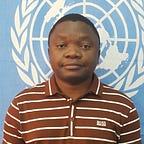Girls’ education gets high marks in Malawi
Community driven by-laws and school meals are encouraging parents to keep their children in school
“We realized that many girls were dropping out of school because of the many challenges they face right from their homes,” says Senior Group Headman M’ndola, a traditional leader in Malawi’s central district of Salima. “Most parents here do not encourage girls to go to school.”
“Once a girl reaches puberty, most parents in this area do not hesitate to marry them off because they consider education as a waste of time,” he adds.
When it comes to ending child marriages and other traditional practices which prevent girls from receiving an education, there is no figure as important as the chiefs in the community. As custodians of culture, they have the power to influence communities through by-laws and share good practices.
“Together with other traditional leaders, we collaborated with the Malawi Police Service, magistrates and local non-governmental organizations to institute by-laws to stop early marriages and other practices that hinder girls from pursuing education,” said M’ndola.
The by-laws came into effect in April 2016 after a series of sensitization meetings supported by the United Nations Joint Programme on Girls Education (JPGE), and attended by the World Food Programme (WFP). Fining traditional leaders and parents who allow their female children to marry before they complete their education is one example of a by-law.
“During sensitization meetings, parents cited poverty and hunger as some of the reasons for not sending their children to school. However, with the provision of free school meals and other support, the situation has changed the mindset of most parents and many have agreed to send their girls back to school,” added Chief M’Ndola.
Princess Gereta, 15, is enrolled in Nsindikiza primary school. “Without the fines parents are forced to pay for marrying off their children, I would not be in school today. Now that we receive school meals and the other support we get like sanitary pads, we have no excuse to miss classes,” she added smiling.
Nsindikiza Primary is one of the schools under Chief M’Ndola. “Before the chiefs’ intervention, the school was registering low girls’ enrollment and high dropout rates among girls due to pregnancies and early marriages. But the number of girls has doubled in the 2017- 2018 academic year. It is the first time we have more girls than boys in this school,” says Samsom Thole, headteacher at Nsindikiza. “The by-laws are really paying dividends because parents are afraid of being fined for failing to send their daughters to school,” Samsom Thole concluded.
The JPGE is helping Malawi build a stronger education system that delivers quality education to both boys and girls. The work of UNICEF, UNFPA and WFP — made possible by the resources provided by the Norwegian Government — is addressing the factors that place girls at risk of dropping out of school. From 2013 to 2017, girls’ enrollment in supported schools grew by 36 per cent and average attendance increased from 64 per cent to 93 per cent. WFP is providing home-grown school meals linked to JPGE to more than 169,000 students. Fresh food is bought locally from 12,000 smallholder farmers who also directly benefit from the programme.
The local communities’ investment, leadership and participation in the project are key to the model’s success. For the many young girls in Malawi who are attending school thanks to this initiative, this also means the possibility of a brighter future.
